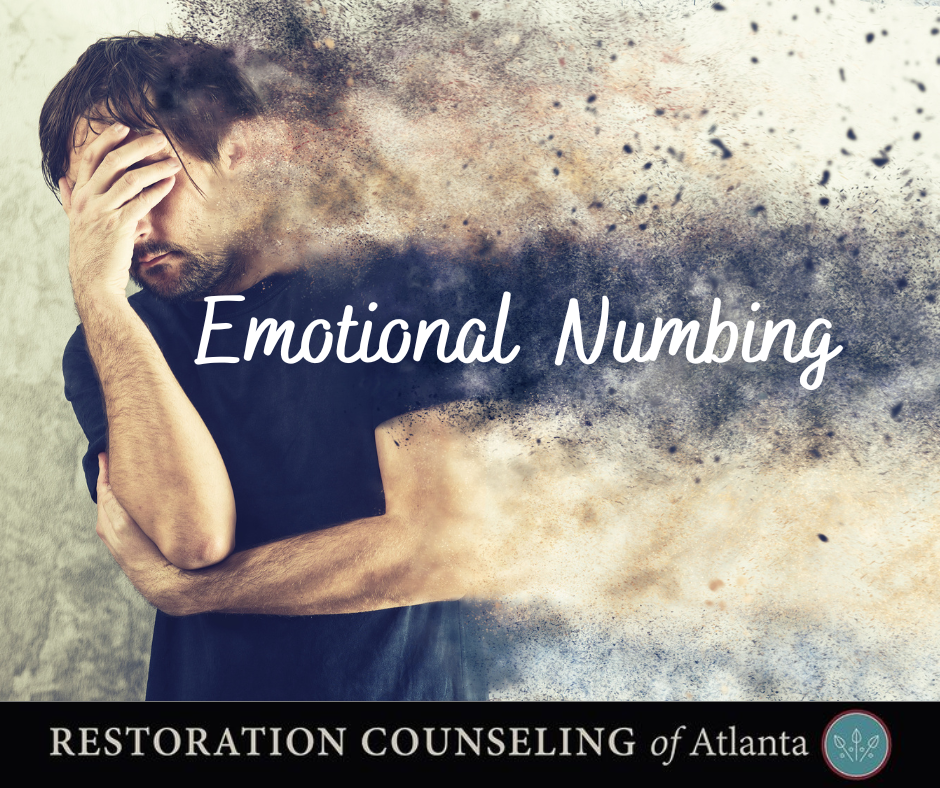With all its ups and downs, experiencing emotion is a normal part of life. After all, our emotions tell us how we are experiencing the world around us. But everyone has a different experience of emotions. Some people feel more strongly than others, while other people may have long-term or temporary difficulty feeling a full range of emotions.
With emotional numbing, in situations where you might be expected to experience joy or sadness, you may feel empty or detached instead. This feeling isn’t positive or negative; instead, it’s absent of emotion.
It is not unusual to feel emotionally numb after or during a very stressful event. A person may also notice a feeling of dissociation or disconnection from the body and the outside world on occasion. Again, this can be temporary or more long-lasting. People who experience severe, persistent, or recurrent symptoms should seek professional advice to heal and resume living a fuller, richer life.
What are the signs of emotional numbness, also called emotional blunting?
The defining symptom of emotional blunting is a numbing of emotional experiences. This includes both how a person feels internally and how they express themselves externally. It might be experienced as an inability to express emotions on their face, behaviors, and other forms of communication.
Some common signs of emotional numbness include:
- a feeling of being disconnected from your mind and/or body
- difficulty socializing, maintaining and forming relationships because of an inability to emotionally connect or relate to those around you
- seeking sensations or emotional stimulation through risky experiences or via self-harming behaviors
- loss of interest in things or indifference to things you once enjoyed
- inability to feel any emotions, positive or negative, no matter how intense the situation is
- difficulty feeling love or affection toward oneself or others
- loss of sex drive
- believing you have no emotions
- a general sense that nothing matters
- the absence of care or concern for others or events in your life
- being unable to express the appropriate level of emotion in a given situation, including having difficulty speaking or feeling “shut down”
- persistent challenges concentrating or with forgetfulness
- experiencing constant fatigue
- a lack of general motivation
- restlessness
According to Sarah Lindberg (2022), “People with emotional numbness might use strategies to resist confronting their emotions. Even if they’re doing it unconsciously, they might use avoidant behaviors and steer clear of certain people or situations. They might be in denial, which is a common defense mechanism people use to avoid emotional triggers and negative feelings.”
What are the causes of emotional numbing?
Emotional numbing is usually a protective reaction to trauma, stress, pain, or discomfort that is experienced emotionally or physically in life. It can be seen as a coping mechanism, though an unhealthy one, because it prevents not just the “bad” emotions from being experienced, but ALL emotions.
Knowing the cause of your emotional numbing can better explain what it is you’re going through and how best to treat it.
The Summit Wellness Group lists some common reasons for emotional numbing:
- Physical or Emotional Pain: The brain may numb itself to protect you from feeling intense amounts of pain or sadness, or anxiety in situations that may be deemed traumatic.
- Post-Traumatic Stress Disorder (PTSD): When someone experiences a specific situation that leads to PTSD, the brain will try to shut out any negative emotions. As mentioned before, this can also lead to shutting out positive emotions, which is why many people struggling with PTSD appear mentally or physically distant at times.
- Grief: Sometimes, when the grief that is experienced feels like too much to handle, the brain will numb itself to feelings to protect itself from the unpleasantness of sadness and loss. The brain doesn’t want to feel negative emotions, so instead, it will turn off the ability to process any emotions.
- Overwhelming Stress: Many people who experience intense anxiety, and even those who have just an episode of extreme stress, may experience some form of emotional numbing because of that stress.
- Depression: One of the side effects of depression is an inability to feel positive emotions, feeling drowsy, and not like yourself.
- Physical, Mental, or Emotional Abuse: A lot of trauma victims will experience emotional numbing to protect themselves from the experience that caused them so much pain. This is why people will sometimes forget what they experienced or only remember bits and pieces.
- Drug Addiction: Drugs can affect emotions in a number of ways. Sometimes people abuse substances to stop feeling things like anxiety or depression, and sometimes the use of a drug can induce emotional numbing.
- Medications or Health Conditions: Emotional numbing or an inability to express one’s emotions may be a side effect of some medications (especially those used to treat mental health conditions like depression or anxiety) or a side effect of some medical conditions themselves.
How is it treated?
Because there is usually an underlying reason for emotional numbness, treating just your inability to feel emotions won’t solve the core problem or stop the emotional numbing. Typically, seeing a therapist is the first step in getting help because they will be able to determine where it came from and how to best treat the source.
A therapist may suggest Cognitive Behavioral Therapy (CBT) or Acceptance and Commitment Therapy (ACT), depending on the underlying causes of your emotional numbing. Both therapies place emphasis on the internal thoughts and emotions that may have led to emotional numbness and help you learn to feel and accept those emotions instead of avoiding the experience of them.
While emotional numbing is not inherently dangerous, this condition may inadvertently lead to interpersonal and relationship issues. So therapy may also include social skills training like assertiveness or boundaries coaching to improve the ability to connect with others.
What can you do about it?
While emotional numbing and its causes should be treated by a licensed mental healthcare professional, there’s plenty that you can do on your own to help find relief.
- When you feel numb or empty, safely stimulate one or more of your senses. This may include smelling a strong essential oil, cuddling with a stuffed animal, petting your dog or cat, taking a warm bath or shower, gripping a piece of ice, or eating spicy or strong-flavored food.
- Try getting back into activities that you once enjoyed. Even if you don’t feel the same amount of happiness that these activities used to fill you with, they can still provide a boost in mood and open up your emotional range.
- Join a support group and create a personal support system to help cope with any diagnosed mental disorders.
- Implement any of these lifestyle changes that can help relieve the stress that leads to temporary emotional numbness:
- engaging in regular physical activity
- trying relaxation exercises
- eating a healthful diet
- getting enough sleep
- identifying triggers and finding new ways to approach them
- discussing feelings with a trusted individual and asking for help when needed
- seeking treatment for stress
Another Tip to Cope
The only way to stop being emotionally numb is to reawaken awareness of what you are feeling!
One possible step towards emotional recognition is to start being mindful of your own physiological responses (aka bodily sensations). Some research has suggested the importance of beginning with your heart rate.
Notice whether your heart rate goes up in certain situations and explore the possibilities of why this could be. A heart rate monitor or fitness watch can also help. With practice, you may become better able to distinguish anger from excitement and fear, for example.
A journal can also help you document your physical responses and emotional patterns. This tool will build awareness and confidence in your ability to self-regulate and respond with appropriate reactions instead of avoiding or shutting down.
It’s also important to keep in mind that negative emotions are just as important as positive ones. Learning how to identify these emotions and work with them (not against them) can help you lead a more fulfilling life.
Reference
Cherney, K., (September 9, 2021). All about alexithymia, or difficulty recognizing feelings. Retrieved from: https://www.healthline.com/health/autism/alexithymia#tips-to-cope
Cirino, E. (May 13, 2021). Recognizing emotional blunting and finding help. Retrieved from: https://www.healthline.com/health/mental-health/emotional-blunting
Gillette, H. (August 25, 2022). 12 Signs someone may be emotionally numb (and why it happens). Retrieved from: https://psychcentral.com/health/signs-someone-is-emotionally-numb
Huizen, J. (September 29, 2020). Feeling numb: What you need to know. Retrieved from: https://www.medicalnewstoday.com/articles/320049
Lindberg, S. (May 24, 2022). What is emotional numbness? Retrieved from: https://www.verywellmind.com/emotional-numbing-symptoms-2797372
The Summit Wellness Group. (n.d.) What is emotional numbing? Retrieved from: https://thesummitwellnessgroup.com/blog/what-is-emotional-numbing/
 by Paige Santmyer, MA APC NCC CCATP
by Paige Santmyer, MA APC NCC CCATP
Roswell location
paige@restorationcounselingatl.com, ext. 157
Paige provides a safe and comfortable atmosphere where clients can explore the challenges they are facing. She also believes in addressing the individual’s entire personhood, assessing needs in all domains of life instead of focusing solely on mental health needs. Paige works with adults and teens around depression, anxiety, mood disorders, relationship issues, trauma, PTSD, and life transitions.

